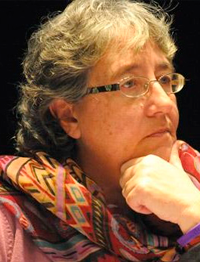
Keynote Speakers
Liz Kelly

Liz Kelly, PhD (Sociology), BA (Sociology and Politics), is professor of sexualised violence at London Metropolitan University, where she is also director of the Child and Woman Abuse Studies Unit (CWASU) and holds the Roddick Chair on Violence against Women. She has been active in the field of violence against women and children for forty years, and is the author of Surviving Sexual Violence, which established the concept of a 'continuum of violence' and over 100 book chapters and journal articles.
Title: The continuum of sexual violence: its overlaps and differences with domestic violence
Both international and national policy frameworks and research agendas have, for two decades, focused on domestic violence, leaving sexual violence on the margins. In this paper I explore the continuum of sexual violence – rape, sexual assault, sexual harassment and sexual exploitation across childhood and adulthood. Whilst some takes places within the domestic context much does not. There are multiple connections, overlaps and differences all of which need to be considered if we are to develop holistic responsiveness to the needs of women and girls and effective prevention.
Marianne Hester

Professor Marianne Hester holds the Chair in Gender, Violence and International Policy in the Centre for Gender and Violence Research at the School for Policy Studies, University of Bristol. She is Editor-in-Chief of the Journal of Gender-Based Violence, and a leading researcher of gender-based violence and has directed groundbreaking research on many aspects of violence, abuse and gender relations, including comparative research on child contact and domestic violence in Denmark and the UK, and comparing domestic violence in China and the UK, progression of domestic violence and rape cases through the criminal justice system.
Title: (What) about the men?
While women have vigorously resisted the label of 'victims', we are increasingly seeing men taking on this mantle. For instance, Donald Trump positions himself as a victim of 'fake media'; and other men see themselves as the victims of domestic abuse by women and are reporting such abuse in ever greater numbers to the police. The talk asks questions about this supposed 'victim status' of men with regard to domestic violence. Can men's experiences in intimate relationships be characterised as coercive controlling violence? and may this differ for men in heterosexual and same sex relationships? To get at the issues the paper uses results from a number of recent studies: findings from a large sample of heterosexual male patients in primary care in England, that measured a range and impacts of potentially domestic violence behaviours (Hester et al, 2017); national research on gay men's experience and use of domestic violence (Hester et al, 2010), and work on 'who does what to whom' (Hester, 2013).
Carolina Øverlien

Carolina Øverlien is an Associate Professor at the School of Social Work, Stockholm University, and a researcher at the Norwegian Institute of Violence and Traumatic Stress Studies (NKVTS). She has undertaken a range of studies on children in difficult life circumstances, including children and adolescents in shelters/refuges for abused women, children who have experienced domestic violence, children who have been physically abused, and children in institutional care.
Title: Research on children experiencing domestic violence - trajectories, methodological shifts, and challenges going forward
Marceline Naudi

Marceline Naudi, PhD, is Head of the Department of Gender Studies and also contributes to teaching and supervision of student research within several other University Departments on gender issues, violence against women and other anti-oppressive issues (LGBTIQ, ethnicities, disabilities) at Diploma, Bachelor, Master and Doctoral level. She also served as the Chairperson of the Commission on Domestic Violence (Malta) from 2006 to 2010 and as a member and Chairperson of the Gender Issues Committee of the University of Malta for many years. She currently sits on the Women Against Violence Europe (WAVE) Network Board, and until recently on the European Women's Lobby (EWL) Observatory on Violence against Women. She is a management committee member of the EU COST Action on Femicide across Europe and of the Action on Appearance Matters.
Title: Monitoring the implementation of the Istanbul Convention
The Convention on preventing and combating violence against women and domestic violence (known as the Istanbul Convention) was adopted by the Council of Europe Committee of Ministers on 7 April 2011, and entered into force on 1 August 2014. Monitoring of the implementation of the convention by the States party to it is carried out by an independent expert body, known as the GREVIO, the 1st ten members of which were elected in May 2015. GREVIO had its 1st meeting in September 2015, and adopted a questionnaire to be used as a monitoring tool in March 2016. Country evaluations started soon after. There are currently 8 countries in different stages of evaluation. The procedures and practice of monitoring and evaluations will be discussed, also considering the challenges faced in the process.
María Lameiras Fernández

Professor María Lameiras Fernández, PhD, is a Professor at the University of Vigo, Department of Psychoeducational Analysis. She has more than 50 published articles, is a researcher in several national and international projects, and has more than 50 years of experience in teaching in several Universities, in Spain and in various other countries. Her research interests are focused on adolescents' sexuality, sexual education, child abuse, perpetrator treatment in prisons, and modern sexism.
Title: Gender Violence and Femicide in South of Europe: the situation in Spain, Italy and Portugal
It is the aim of this talk to explore the situation of gender violence in Europe, specifically the incidence of femicide committed by partners or ex-partners in Spain, Italy and Portugal. Available data inform us of the high prevalence of femicide in Portugal, with twice as many cases as in Spain and Italy. It is noted that the majority of the victims of violence in the three countries were murdered by their intimate partners, as opposed to by their ex-partners. We conclude that the development of appropriate services positively influences the occurrence of femicide in Southern European countries, so that rates of femicide are lower in countries where policy development and data collection are comparatively more consistent over time. Finally, the study highlights the reasons why femicide data is relevant, and what special contribution it can bring to understanding the more general phenomenon of violence against women and gender-based violence.
Marsha Scott

Dr. Marsha Scott is a feminist activist, researcher and practitioner and has advocated, volunteered, researched, and worked in the violence against women sector in the United Kingdom, the United States and Europe for 30 years. Dr. Scott is currently the Chief Executive of Scottish Women’s Aid, Scotland’s national domestic abuse policy, advocacy, and services charity. Prior to taking up post at Scottish Women's Aid in April 2015, Marsha worked for 10 years at West Lothian Council, where she helped set up and had strategic responsibility for the West Lothian Domestic and Sexual Assault Team.
Title: Designing services that challenge coercive control, or, "Aye, it's the patriarchy, sister"
Summary: While (some) countries across Europe are working to embed the new coercive control paradigm into their criminal and civil laws (e.g., http://www.parliament.scot/parliamentarybusiness/Bills/103883.aspx), national and local support organisations can use the stories of women to examine our own paradigms about support and resistance. Dr. Scott will explore the concept of space for action as a frame for designing services that challenge the everyday oppressions and constraints of patriarchal socioeconomic structures.
Walter DeKeseredy

Walter S. DeKeseredy is Anna Deane Carlson Endowed Chair of Social Sciences, Director of the Research Center on Violence, and Professor of Sociology at West Virginia University. He has published 22 books, 89 scientific journal articles and 76 scholarly book chapters on violence against women and other social problems. In 2008, the Institute on Violence, Abuse and Trauma gave him the Linda Saltzman Memorial Intimate Partner Violence Researcher Award. He also jointly received the 2004 Distinguished Scholar Award from the American Society of Criminology's (ASC) Division on Women and Crime and the 2007 inaugural UOIT Research Excellence Award. In 1995, he received the Critical Criminologist of the Year Award from the ASC’s Division on Critical Criminology (DCC) and in 2008 the DCC gave him the Lifetime Achievement Award. In 2014, he received the Critical Criminal Justice Scholar Award from the Academy of Criminal Justice Sciences' (ACJS) Section on Critical Criminal Justice and in 2015, he received the Career Achievement Award from the ASC's Division on Victimology. In 2017, he received the Impact Award from the ACJS’s section on Victimology.
Title: Violence Against Women in Rural America
Summary: We now have strong statistical evidence showing that rural women in the United States are at greater risk of being victimized by various types of male violence than are their suburban and urban counterparts. The main objective of this keynote address is is twofold: (1) to briefly review the sociological empirical and theoretical work on rural woman abuse in America and (2) to identify new ways of understanding violence against rural women.

© Faculty of Psychology and Education Sciences of the University of Porto - Portugal
